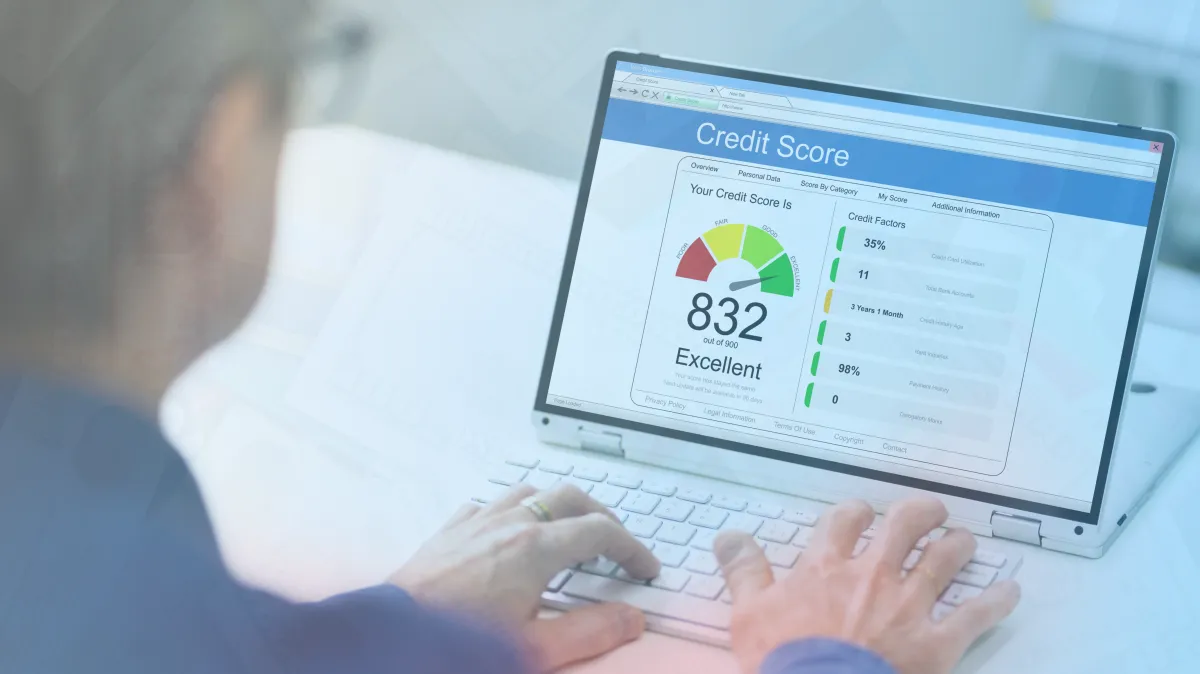7 Essential Steps To Clean Your Credit Report
Written by: RIC Staff
November 12, 2024
Topics: 7 steps to clean your credit

Your Credit Report is More Than Just a Number...
It’s your financial reputation. Errors, missed payments or even old debt in collections can cost you opportunities, from lower interest rates to new job openings. Here’s a step-by-step guide to help you clean up your credit report, take control of your financial future, and set yourself up for a stronger credit profile.
1. Step One: Start with a Full Credit Report Check
Start by pulling a free credit report from each of the three major bureaus:
Equifax, Experian, and TransUnion.
Under the Fair Credit Reporting Act (FCRA), you’re entitled to one free report from each bureau every 12 months, making it easier to stay on top of potential issues and identify areas for improvement.
Pro Tip: Check one report every four months for regular insight without overwhelming yourself.
2. Line-by-Line Review: Uncover the Details That Could Be Costing You
Take your time with this step; go through your credit report line-by-line. Review loan statuses, payment histories, account balances, and even personal details.
Ensure each entry accurately reflects your credit activity, especially if you’ve paid off loans or moved recently.
Did You Know? Mistakes like incorrect addresses or unfamiliar accounts may signal identity theft. Catching them early can save your credit.
3. Dispute & Correct Any Errors Promptly
Found a mistake? Don’t ignore it.
File a dispute with the reporting bureau, and if you have documentation (like a paid-off statement or proof of identity), include that as well.
Credit bureaus have 30 days to verify and correct errors, so keeping documentation handy will streamline the process.
Quick Note: Services like Repair It Credit can guide you through this process, saving you time while ensuring all errors are corrected efficiently.
4. Get Past-Due Accounts Off Your Record with a Goodwill Letter
If you have missed payments that are dragging down your score, consider writing a goodwill letter to your creditor.
In many cases, a one-time late payment can be forgiven if you have a strong history with the lender.
Quick Note: Though creditors aren’t obligated to comply, goodwill letters are often worth the effort.
5. Lower Your Credit Utilization Ratio to Boost Your Score Fast
Your credit utilization ratio is a powerful factor in your score calculation, impacting around 30% of it. Aim to keep your balance below 30% of your available credit—better yet, shoot for 10-20% if possible.
Paying down debt or setting a target budget can help you achieve this while freeing up credit and improving your score.
There is a reason why you see many credit experts tell you this a dozen times, because this can significantly boost or decrease your score.
Example: If you have $10,000 in available credit across cards, keep your balance at or below $3,000 to keep that ratio healthy.
6. Pay Off Collections or Negotiate Settlements
Accounts in collections can make a heavy dent in your score, but paying them off—or settling them for a reduced amount—can improve your standing with lenders.
When paid, some credit scoring models may weigh these accounts less heavily, while others ignore them entirely.
Quick Note: This can also demonstrate your commitment to resolving financial obligations, a plus in lenders’ eyes.
7. Make Credit Monitoring a Habit: Repeat Every 6-12 Months
Cleaning your report is an ongoing process, especially as new accounts, payments, and updates appear.
Regularly check your credit report and keep an eye out for inaccuracies, missed payments, or signs of identity theft.
Tools like Experian and ExtraCredit® can provide regular updates, helping you avoid any future credit mishaps.
Routine Reminder: Repair It Credit also offers clients customized reminders to check their credit regularly, so you can stay proactive in protecting your financial health.
Take Full Control of Your Credit Score
A clean credit report is one of the best investments you can make in your future, whether it’s saving on mortgage interest, getting approved for a loan, or even securing a new job.
With these steps, you’re set to take control of your credit and watch your financial opportunities expand and approval chances significantly increase.
Get Your Complimentary Session With A Credit Expert Today.
Your Credit Report is More Than Just a Number...
It’s your financial reputation. Errors, missed payments or even old debt in collections can cost you opportunities, from lower interest rates to new job openings.
Here’s a step-by-step guide to help you clean up your credit report, take control of your financial future, and set yourself up for a stronger credit profile.
1. Step One: Start with a Full Credit Report Check
Start by pulling a free credit report from each of the three major bureaus:
Equifax, Experian, and TransUnion.
Under the Fair Credit Reporting Act (FCRA), you’re entitled to one free report from each bureau every 12 months, making it easier to stay on top of potential issues and identify areas for improvement.
Pro Tip: Check one report every four months for regular insight without overwhelming yourself.
2. Line-by-Line Review: Uncover the Details That Could Be Costing You
Take your time with this step; go through your credit report line-by-line.
Review loan statuses, payment histories, account balances, and even personal details.
Ensure each entry accurately reflects your credit activity, especially if you’ve paid off loans or moved recently.
Did You Know? Mistakes like incorrect addresses or unfamiliar accounts may signal identity theft. Catching them early can save your credit.
3. Dispute & Correct Any Errors Promptly
Found a mistake? Don’t ignore it.
File a dispute with the reporting bureau, and if you have documentation (like a paid-off statement or proof of identity), include that as well.
Credit bureaus have 30 days to verify and correct errors, so keeping documentation handy will streamline the process.
Quick Note: Services like Repair It Credit can guide you through this process, saving you time while ensuring all errors are corrected efficiently.
4. Get Past-Due Accounts Off Your Record with a Goodwill Letter
If you have missed payments that are dragging down your score, consider writing a goodwill letter to your creditor.
In many cases, a one-time late payment can be forgiven if you have a strong history with the lender.
Though creditors aren’t obligated to comply, goodwill letters are often worth the effort.
Quick Note: Though creditors aren’t obligated to comply, goodwill letters are often worth the effort.
5. Lower Your Credit Utilization Ratio to Boost Your Score Fast
Your credit utilization ratio is a powerful factor in your score calculation, impacting around 30% of it. Aim to keep your balance below 30% of your available credit—better yet, shoot for 10-20% if possible.
Paying down debt or setting a target budget can help you achieve this while freeing up credit and improving your score.
There is a reason why you see many credit experts tell you this a dozen times, because this can significantly boost or decrease your score.
Example: If you have $10,000 in available credit across cards, keep your balance at or below $3,000 to keep that ratio healthy.
6. Pay Off Collections or Negotiate Settlements
Accounts in collections can make a heavy dent in your score, but paying them off—or settling them for a reduced amount—can improve your standing with lenders.
When paid, some credit scoring models may weigh these accounts less heavily, while others ignore them entirely.
Quick Note: This can also demonstrate your commitment to resolving financial obligations, a plus in lenders’ eyes.
7. Make Credit Monitoring a Habit: Repeat Every 6-12 Months
Cleaning your report is an ongoing process, especially as new accounts, payments, and updates appear.
Regularly check your credit report
and keep an eye out for inaccuracies, missed payments, or signs of identity theft.
Tools like Experian and ExtraCredit® can provide regular updates, helping you avoid any future credit mishaps.
Routine Reminder: Repair It Credit also offers clients customized reminders to check their credit regularly, so you can stay proactive in protecting your financial health.
Take Full Control of Your Credit Score
A clean credit report is one of the best investments you can make in your future, whether it’s saving on mortgage interest, getting approved for a loan, or even securing a new job.
With these steps, you’re set to take control of your credit and watch your financial opportunities expand and approval chances significantly increase.
Get Your Complimentary Session With A Credit Expert Today.









